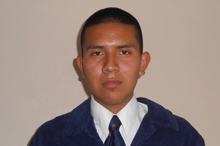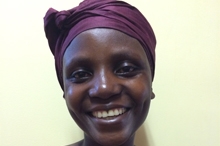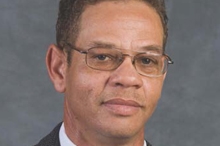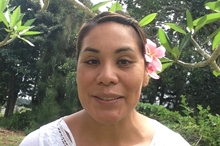Champions of Change Blog
Agriculture – My Past and My Future
Posted by on August 4, 2014 at 4:12 PM EDT
Jesus Rodriguez is being honored as a Future of American Agriculture Champion of Change.
Being from a migrant worker family has developed me into the person that I am and influenced the attitude that I have towards receiving a higher education.
My parents are both employed in the tree fruit industry. My dad is a tree fruit harvester and my mom is an apple sorter. My dad has been harvesting all types of tree fruit for 32 years now. My mom has been sorting apples for seven years at the packing shed. Despite their long days and hard work, my parents still have enough energy to work extra hours and perform more tasks. After a long day of harvesting cherries, my dad would wait until it got cool enough to be able to thin apples. He would then thin until it got too dark to work. In addition, he is a mechanic for anyone with car troubles and a gardener for my mom. When it comes to my mom, she is a strong woman that I admire and love so much. She could work overtime and still have enough energy to cook an elaborate dinner and clean anything that is untidy.
I once asked my parents why they worked as much as they do and they told me that they would like to give me what their parents were unable to give them. Without hesitation I can proudly say that I have been blessed with parents that love me unconditionally, provide for me, and are willing to sacrifice themselves for the future of their kids. Therefore, I believe it is my duty to take care of my parents after the hardships, obstacles, and sacrifices they have faced and overcome for my siblings and me.
I developed a strong work ethic working in the orchard beside my father pushing myself to do as good a job and to work as fast as he does. I took that work ethic to the classroom and achieved good marks and earned college credit. I was fortunate enough to be awarded enough scholarship dollars to get just over halfway through my college education, and I feel confident that I can earn the rest. I plan to make agriculture my career based on my past experiences in the field, my Future Farmers of America (FFA) and agriculture education experience, and the fact that in my working life we will have to produce as much food as we have in all of history to feed an ever increasing world population.
My path to success and financial stability lies on the road through an orchard, which I hopefully will someday own. Then, the only apples my dad will have to pick are the apples that he wants to eat.
Jesus Rodriguez was born in Los Angeles, California the son of Mexican and El Salvadoran immigrants. His family moved to the Chelan Valley in Central Washington State before he entered school to work in the tree fruit industry. He will enter college this coming fall pursuing a degree in Horticulture at Washington State University.
Learn more aboutEnsuring the Future of Farming through Community
Posted by on August 4, 2014 at 4:06 PM EDT
Jacob Hunt is being honored as a Future of American Agriculture Champion of Change.
I always knew that returning home would not be the easy choice, but, as it turns out, it was the right one. Growing up, I began to realize that some people saw the farming lifestyle as boring, unproductive, and unprofitable – and I watched other kids my age leave the place where we grew up to go pursue careers in the city.
I saw opportunity in the business my parents had grown over the past 12 years. I saw an opportunity for diversification, new revenue, and new customers. I seized this opportunity by preparing myself to be a new farmer and working hard at several educational opportunities. I began my journey by interning at the University of Delaware Creamery, and then post-graduation, working at Delaware’s largest dairy farm.
While in college, I learned the importance of staying connected to your local community. When I began working for the creamery, the groundwork for the UDairy Creamery had been laid, nearly funded, and we were about to begin construction on our campus scoop shop and production facility. When I began, we were also still in the process of acquiring customers (something you would not think would be too difficult for an icecream business on a campus of nearly 20K+ college students). We knew to be successful, we had to stay connected to the student body and university community - participating in on-campus and off-campus events and establishing a connection to our customers.
The importance of the customer connection has been strengthened over the past year on my family’s farm. After starting my own creamery, expanding our brand and image, and diversifying our product line – I know that keeping our small business alive always begins with customers.
Through public education and outreach, we have been able to double our reach. By participating in USDA programs such as WIC and staying involved in local farmers markets, the business has a direct connection to what our customers need and what drives purchasing. When considering expansion plans, I always keep in mind what impact they will have on existing and future consumers, how I can integrate public education about the importance of small-scale family farming, and the effect our actions have on the environment. We have 30,000+ visitors each year, half of which are under the age of 18.
The future of American agriculture starts with a public connection—sharing with our neighbors and our communities the connection and importance it has in each and every one of our lives, and that staying connected to your local farm neighbors helps ensure the success of local economies.
Jacob Hunt, managing partner of Windy Brow Farms and The Cow’s Brow Creamery, works to ensure agricultural viability through diversification for his family’s small-scale farm in Northern New Jersey.
Learn more aboutLand and Opportunity – A Life in Agriculture
Posted by on August 4, 2014 at 11:02 AM EDT
Fabiola Nizigiyimana is being honored as a Future of American Agriculture Champion of Change.
I was born in Rwanda and raised in Burundi, where the majority of people are subsistence farmers who sell their crops for domestic consumption. Farming has always been a vital part of my life, as I was a farmer in Burundi before I came to the United States in 2007 as a refugee. I am extremely grateful to the U.S. government for providing me with the opportunity to come here, and since my arrival in the U.S. I have been given many more opportunities. In 2010, I began farming at the Flats Mentor Farm (FMF) in Lancaster, Mass., which is a program of World Farmers that gives free land the first year to immigrant and refugee farmers who want to continue farming. I started out with a single plot of land, but I now farm two acres.
Another opportunity came my way in 2012, when I applied to the U.S. Department of Agriculture Environmental Quality Incentives Program as a new farmer, under the guidance of Maria Moreira from the Flats Mentor Farm, and was successful in acquiring a high tunnel. I am thankful to the Department of Agriculture for providing me with this opportunity, as the high tunnel has benefited me in countless ways. My high tunnel allows me to start growing my produce earlier in the season so I can go to the marketplace two to three weeks before everyone else, and allows me to continue growing my crops after the season ends. In 2013, I was able to sell my crops wholesale through our Immigrant Farmer Marketing Cooperative thanks to my high tunnel. Along with the additional income it provides, it also gives food security to me and my five children. Here, as in Burundi, I farm to help both my family and my community.
In addition to being the first African woman refugee farmer at FMF to own a high tunnel, I am also a founding member of the Immigrant Farmer Marketing Cooperative. This cooperative helps the farmers at FMF to sell their crops for a profit while also bringing the community closer together. I personally help the community in other ways, such as through translation. Many farmers speak little English or none at all, and because I speak five languages I am able to act as a translator if any problems arise.
I heard about the Flats Mentor Farm from members of my church in Worcester, Mass., where I have lived since arriving in the U.S. I tell my friends that through farming and its learning opportunities, they will be able to support themselves and our community in terms of food security. I currently have two other jobs to provide for my family, but farming is my favorite job.
Although it is my favorite job, farming is not easy and many hardships can and do arise. However, I love farming and the opportunities it provides are invaluable. I am very happy and honored to have been selected as a Future of American Agriculture Champion of Change, and I hope that this nomination will show farmers both at FMF and around this country that their hard work is irreplaceable, and also that it might inspire others to begin farming as well.
Fabiola Nizigiyimana is a leader in her community, a mentor farmer at Flats Mentor Farm in Lancaster, MA, the owner of a high tunnel from NRCS-USDA program, a founding member of the Immigrant Farmer Marketing Cooperative, and a single mother of five who speaks five languages.
Learn more aboutFood for Thought: Sustaining Diversity in Agriculture
Posted by on August 4, 2014 at 10:53 AM EDT
Bill Bridgeforth is being honored as a Future of American Agriculture Champion of Change.
I’m grateful to the Obama Administration for implementing the Champion of Change Award to recognize the hard work and sacrifices of so many everyday people who have dedicated their lives to making a positive difference in their communities. My passion is maintaining diversity in American agriculture.
I am one of 13, eight boys and five girls, raised on the family farm. I have vivid memories of working for Papa (Grandfather), chopping cotton, picking cotton, and mowing grass. At the age of 12, I knew I wanted to be a farmer. Mother (Elizabeth), who passed away when I was 15, Daddy (Darden), and Willie (my stepmother), all exemplified the proper work ethic and contributed to my confidence to become a leader.
If there has ever been a segment of agriculture that should be on the endangered species list, it is for sure the black farmer. As of 2007, black farmers made up 1.3 percent of the farming community, with an average age of 60.3. The average farm operator in the United States managed 418 acres while the average black farm operator managed 104 acres. Black farmers are typically underrepresented at the local USDA Farm Service Center both when it comes to program enrollment and program utilization. The National Black Growers Council (NBGC) was organized to be a resource for USDA and agricultural corporations desiring to network and gain insight on how their policies and programs impact the black row-crop farmer.
The National Black Growers Council advocates for black row-crop producers while encouraging diversity. The NBGC hosts several Model Farm Tours in various locations. On the Model Farm Tour a member of the NBGC invites the public to his or her farm to demonstrate precision agriculture, biotechnology, and how the participation in USDA programs all work together in building a successful business. The Model Farm Tour also serves as a forum the Extension Service to review the more basic aspects of crop production such as pest control, fertilization, and seed selection. Most farm tours will include a variety trial to demonstrate new technology for pest management and yield enhancement. Irrigation, crop insurance, and grain storage are also discussed.
Internationally, the NBGC has consulted with emerging farms in Africa. Our task is to help emerging farmers become commercial farmers by embracing proven and safe technology used in the United States. Representatives of the council have traveled to South Africa, Kenya, and Gambia to observe local agriculture. We have had the privilege of collaborating with International Services Council of Alabama to host African agribusiness men and women at Bridgeforth Farms.
All this matters because agriculture matters. I am passionate about leaving a legacy for future generations and helping to be part of its bright future.
Bill Bridgeforth is a Senior Partner at Darden Bridgeforth and Sons; he is Chairman of the National Black Growers Council, and a member of Alabama A&M University’s Agriculture. Advisory Board. Also, Bill is on the Executive Board of the Council of Agricultural Research, Technology, Extension, and Teaching (CARET).
Learn more aboutWorking for the Future of the Beef Community
Posted by on August 4, 2014 at 10:45 AM EDT
Adam McClung is being honored as a Future of American Agriculture Champion of Change.
It is an honor to be selected as a Champion of Change for the Future of American Agriculture. Agriculture has always been a part of my life and has impacted me down to my very core. It is inspiring to know that we live in a country that still values agriculture and the people engaged in it at the highest levels.
My family has been actively involved in agriculture - specifically beef production - for generations. But the farther down my own road I have traveled, the wider I have wanted my path to be. That is to say, the more involved I have wanted to become. So, while keeping my feet firmly planted in agriculture, I started branching out to work advocating for and representing the agricultural community at the policy table and in the news. With so many people now generations removed from the farm, it is important for those of us who are farmers and ranchers to be a voice for our industry and neighbors – for the hard work, dedication, and passion we all share. I wanted to be a voice for these salt of the earth folks that feed a world. It is now a growing, deep passion I have to make sure that beef producers and the agricultural community’s ideas, farms, ranches, education, production, and markets remain viable.
I have spent the past decade involved in and leading an organization the represents the beef community – the Arkansas Cattlemen’s Association. I cannot begin to explain the satisfaction that comes from touching the lives of so many involved in agriculture. I get to do this by representing producers’ ideas and experience, working to enhance their business climate, building trust with their consumers, providing education so as to allow them to make better decisions within their operations, and making stronger leaders and building new ones. All this work not only paves the way for safer agricultural products for a growing population, but also assures sustainability for the ever-changing agricultural community.
I also wanted to instill this passion in young producers and their families who are getting started or becoming a part of agriculture. So within the Arkansas Cattlemen, we created a young producer program that spends the course of a year exposing new and beginning farmers and ranchers to the tools they need to be leaders - not just for our organization, but leaders for agriculture as a whole. When they finish the program we hope that they know and understand the need for agricultural leaders not only on a national level, but in their local communities as well.
Adam McClung is the Executive Vice President for the Arkansas Cattlemen’s Association, a non-profit organization. The Arkansas Cattlemen’s Association has been working for the cattlemen of Arkansas since 1959 and is devoted to improving the cattle industry through producer education and representation on legislative and regulatory issues.
Learn more aboutPreserving A Way of Life
Posted by on August 4, 2014 at 10:31 AM EDT
Adae Romero is being honored as a Future of American Agriculture Champion of Change.
My grandparents were my teachers. They taught me how to watch the seasons, interpret the clouds, and how to feel the earth so it would produce.
I was born and reared in Cochiti Pueblo, New Mexico, as a granddaughter of a Pueblo farmer. At an early age, I realized the needs of Indigenous farmers and tribes are often overlooked in the development of agricultural law, programs and regulations, so I attended the University of Arkansas College of Law’s Food and Agricultural Law Program, where I received a Master of Laws degree, an advanced law certification, and worked with the Indigenous Food and Agricultural Initiative.
Now I consult for First Nations Development Institute, a leading Native American nonprofit whose mission is to strengthen American Indian economies. There, I monitor food and agricultural law and its effects on Indigenous producers, write about the inclusion of Indigenous farmers in federal programs and lawmaking, and work with Indigenous farmers across the country to strengthen agricultural economies and develop healthy food and agricultural businesses.
Cochiti Youth Experience, Inc. (CYE) started out as a conversation around a table after a traditional Pueblo feast. The mothers, daughters, sisters, and grandmothers sat together, speaking of their grandparents, times passed, and connections that they hoped to pass down to Cochiti young people. Those gatherings, when people sit and eat, talk and laugh, no matter how often they occur, have their way of changing people. After that night, we took action.
Two months later, we were incorporated as a non-profit, with a six woman board, and began conversations with the Tribe about how to administer community programs focused on food and agriculture and how to best incorporate Cochiti values into programs. None of the original board members, aside from one, were seasoned in non-profit operations, but each one of the original board members knew Cochiti and wanted to ensure that Cochiti children knew that same place. All our best stories and favorite Cochiti stories occurred in the fields. We wanted our children in the fields.
We were all the daughters and granddaughters and wives of Pueblo farmers. The board consisted of one lady who was considered the most knowledgeable traditional Cochiti cooks, knew Cochiti prior to the construction of roads, and remembered it as a place that was completely self-sustaining. Another board member ran a 4-H program for over twenty years before 4-H existed as a national program. Another was the first ever state director of health that came from a Pueblo. Another was a young high school junior. I had just returned from law school. Together, we made CYE work.
After Tribal Council approval, CYE began to grow farmers. We began farmer mentorship programs that paired young people with traditional Pueblo farmers over the course of a growing season. We began traditional cooking programs so young people know how to harvest, store, process, and cook the traditional crops. CYE has worked with Keres Children’s Learning Center (KCLC), a Montessori language immersion pre-school, to begin a farm to pre-school program. We conducted a food assessment of our community, the state of Cochiti agriculture, and our basic food economy. Today, we are in our third year of work and have supported twenty new farmers in Cochiti. Most importantly, we have demonstrated to others outside Cochiti that our Pueblo producers have timeless value to not only Cochiti, but the nationwide agricultural community.
Undoubtedly, Cochiti would have thrived and continued without the existence of CYE. But now with CYE, the conversation about agriculture, food, and its importance to the future of our small Pueblo is a much more conscious one. The times have changed our small community tremendously, but CYE hopes to ensure that our commitment to agriculture, our farmers, our children, and our lands does not change but is strengthened one seed, one conversation, and one growing season at a time.
Much like my grandparents who offered me lessons about the world, Cochiti, and my responsibility through each seed sown and each word spoken, I hope to demonstrate to future generations of people that the timeless lessons of our Indigenous ancestors inform both our world today and our future.
Vena A-dae Romero (Cochiti/Kiowa) is the co-founder of Cochiti Youth Experience, Inc., on her home reservation located in Cochiti Pueblo, New Mexico. She currently consults with First Nations Development on Indigenous Food and Agricultural projects including that in Waimea Hawaii and throughout the United States. She resides on the island of Lanai, Hawaii.
Learn more about
- &lsaquo previous
- …
- 18
- 19
- 20
- 21
- 22
- 23
- 24
- 25
- 26
- …
- next &rsaquo
White House Blogs
- The White House Blog
- Middle Class Task Force
- Council of Economic Advisers
- Council on Environmental Quality
- Council on Women and Girls
- Office of Intergovernmental Affairs
- Office of Management and Budget
- Office of Public Engagement
- Office of Science & Tech Policy
- Office of Urban Affairs
- Open Government
- Faith and Neighborhood Partnerships
- Social Innovation and Civic Participation
- US Trade Representative
- Office National Drug Control Policy
categories
- AIDS Policy
- Alaska
- Blueprint for an America Built to Last
- Budget
- Civil Rights
- Defense
- Disabilities
- Economy
- Education
- Energy and Environment
- Equal Pay
- Ethics
- Faith Based
- Fiscal Responsibility
- Foreign Policy
- Grab Bag
- Health Care
- Homeland Security
- Immigration
- Innovation Fellows
- Inside the White House
- Middle Class Security
- Open Government
- Poverty
- Rural
- Seniors and Social Security
- Service
- Social Innovation
- State of the Union
- Taxes
- Technology
- Urban Policy
- Veterans
- Violence Prevention
- White House Internships
- Women
- Working Families
- Additional Issues

